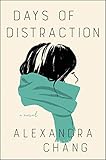The offerings that accumulate in Chinese cemeteries on Tomb Sweeping Day often look less like gifts for the dead than mini manifestations of the desires of the living. Tiny, folded paper outfits folded up (later burned and sent to ancestral spirits) betray the sartorial ambitions of their living relations. Lavish paper houses symbolize the security of home ownership. Stacks of colorful banknotes in denominations of ten thousand and joss paper credit cards with limits of 1,000 billion USD come across as elaborate jokes orchestrated by the bereaved and ignited with ironic solemnity. In April 2023, The Bangkok Post reported on Tomb Sweeping Day activities at a Chinese cemetery in Thailand, where a three-day film festival was held “for the entertainment of the spirits.” Regardless of whether these gestures please the dead, they certainly please the living.
The desires of the living, as varied in kind as offerings burned for ghosts, formed the heart of Alexandra Chang’s 2020 debut novel Days of Distraction, which packed the fever-pitched flightiness of the contemporary news cycle—its daily doses of misogyny, racism, spite, and absurdity—into bite-sized text blocks. Days of Distraction was subsequently devoured that year by readers in lockdown who found themselves as diverted and unmoored as Chang’s protagonist. By contrast, Chang’s first story collection, Tomb Sweeping, whose narratives are set in the near future—a dialed-up present—takes the long view when it comes to themes of family, history, society, and love.
was subsequently devoured that year by readers in lockdown who found themselves as diverted and unmoored as Chang’s protagonist. By contrast, Chang’s first story collection, Tomb Sweeping, whose narratives are set in the near future—a dialed-up present—takes the long view when it comes to themes of family, history, society, and love.
The best of Chang’s stories possess an unsentimental, fable-like quietude that calls to mind Fleur Jaeggy’s I Am the Brother of XX , wherein the strangeness of relationships, particularly familial bonds, are scrutinized through a lens of equally strange, rose-tinted nihilism. Other stories by Chang resemble, in their handling of dialogue and power, the works of American literary cult figure Jane Bowles. While Chang’s novel was caustic in its criticality and rode on the momentum of its narrator’s unraveling relationships with the tech world, America, and whiteness, the 15 stories in Tomb Sweeping—featuring the likes of a nosy housesitter, a woman who runs an illegal mah-jong den, an eccentric orchid enthusiast, and a pair of bickering cat owners—make room for the kind of ambiguity and playfulness one might find in a Bowlesian novel like Two Serious Ladies
, wherein the strangeness of relationships, particularly familial bonds, are scrutinized through a lens of equally strange, rose-tinted nihilism. Other stories by Chang resemble, in their handling of dialogue and power, the works of American literary cult figure Jane Bowles. While Chang’s novel was caustic in its criticality and rode on the momentum of its narrator’s unraveling relationships with the tech world, America, and whiteness, the 15 stories in Tomb Sweeping—featuring the likes of a nosy housesitter, a woman who runs an illegal mah-jong den, an eccentric orchid enthusiast, and a pair of bickering cat owners—make room for the kind of ambiguity and playfulness one might find in a Bowlesian novel like Two Serious Ladies . And like the latter’s lively and outspoken women, Chang’s characters, armed with college degrees in rhetoric and razor-sharp self-awareness, are as difficult as they are endearing.
. And like the latter’s lively and outspoken women, Chang’s characters, armed with college degrees in rhetoric and razor-sharp self-awareness, are as difficult as they are endearing.
Arguably the most affecting thematic thread in Tomb Sweeping is that of intergenerational bonds. Children observe their parents, grandchildren attempt to relate to their grandparents, and we see how these ties are strained by trauma and complicated by technology. We also sense how the responsibility of caretaking shifts—sometimes slowly, sometimes all at once—from the older generation onto the younger and are reminded that, in the US alone, tens of millions of individuals act as unpaid informal caregivers to elderly adults, often parents who suffer from Alzheimer’s or other dementia. In Lisa Hsiao Chen’s Activities of Daily Living, a parent’s decline is compared to performance art—specifically, the year-long durational works of Tehching Hsieh. In my own family, these protracted periods of care and heartbreak have resembled decades-long marathons.
In Tomb Sweeping, Chang addresses forms of elder care that are even less formal: under-the-radar, unsung, and unconscious acts of emotional labor dropped into conversations, furniture arrangements, daily routines, and long-term plans. What can be said to convince a parent to eat healthier on account of their prediabetes, high cholesterol, and underactive thyroid? How do we ask our grandparents to question the racist beliefs they’ve held all their lives? Where is the line between care and control, compassion and passivity, freedom and neglect?
“Li Fan,” a story told in reverse chronological order, begins when an elderly woman known by locals as “the Asian recycling lady” dies in the street while collecting cans: “The residents of Pleasant, too new to have known her when she lived on the block, pick up the stray bottles and cans at the bottom of the street. An ambulance arrives to take the old woman away. She has a stroke by the gutter and dies.” The spectacle of her demise—the loneliness of her death—is later connected to the fact that she and her late husband have no children. Although family is, in itself, no cure for the loneliness of aging and death, the specter of the socially marginalized, childless elder nonetheless haunts Chang’s story collection.
“Farewell, Hank” takes place during a funeral for a living person: Hank is ill, likely with dementia, and his wife, whom everyone calls Orchid Lady on account of her flower obsession, throws him a party at which members of the community eulogize him, much to their discomfort. Hank is “propped up in a leather recliner with his feet up, flanked by two pots of giant orchid arrangements.” Orchid Lady tries repeatedly to put a “cheesy golden crown” on his head. Rendered obsolete in his old age—having become, like his wife’s orchids, a decorative object in his own home—Hank’s fate and Orchid Lady’s magical thinking, makes a deep impression on the story’s protagonist, a young woman who accompanies her middle-aged mother to the “funeral,” which reminds her in turn of her mother’s mortality and her own inevitable loss.
In these stories, mourning often begins before any diagnosis. In “A Visit,” a woman’s elderly father drives from Northern California to her house in upstate New York. The solo road trip that ought to take 10 days takes him three weeks, due to his poor sense of direction and, it’s later implied, his drinking. The woman spends the day of her father’s arrival “in a blur of vacuuming, dusting, mopping, wiping, and scrubbing.” When he arrives, she notices his white hair. “She sees a small limp in his step,” Chang writes. “She sees a Band-Aid on his palm.” She lets him rearrange her furniture and kitchen appliances, fix the heating ducts, the faucet spray hose, the lights, and the floorboards, until she realizes that “his being there is a strain not only on her but on him.” These quiet labors of love haunt the woman after her father leaves.
Chang seems, on a whole, to be less concerned with seismic shifts in parent-child relationships than with the subtle push-and-pull that keeps them intact. There are times, however, when maintaining the status quo proves inadequate. In the collection’s title story, the narrator, a preteen named Ling Ling living in Singapore, sees a new, unflattering side of her grandfather when her family encounters a Japanese medium performing Tomb Sweeping Day rituals on Changi Beach. In a fit of rage, Ling Ling’s grandfather unloads on her his stories from the war and occupation. During World War II, Ling Ling learns, Japanese soldiers executed 66 Chinese men on Changi Beach. One of those men was her great-uncle. In her grandfather’s mind, the Japanese soldiers’ atrocities more than justify his intolerance toward the new medium. After her grandfather dies, Ling Ling recalls the “slamming of hands on tables, long stretches of embittered silence, and […] cracked-voice racial slurs” that no one in her family truly confronted. Neither time nor ritual can excise her grandfather’s bitterness from his legacy, Ling Ling realizes. Care, Chang argues, beyond providing basic needs, must at times be antagonistic, discursive, and emotionally challenging.
One of the final stories in the collection, “Persona Development,” asks what role tech can and should play in elder care. Here, a woman spies on her aging parents using a dystopian surveillance system, which her parents consented to having installed. Like Xu Bing’s 2017 feature-length film Dragonfly Eyes, which features no actors, only CCTV footage spliced from cameras all over mainland China, Chang’s story is told from a voyeur’s point of view. The woman, Patricia, watches through multiple “Eyze Cams” as her parents eat blurry plates of food and mill about their respective living spaces. Patricia’s father in turn spends a great deal of time watching a YouTube channel that recreationally surveils the streets of Zhuhai, China. As Patricia’s desire to check in on her parents from above develops into an unnerving addiction, the story interrogates the ethics of surveillance—do different rules apply to watching your parents than, say, watching your children, your pets, or strangers (as in the case of Dragonfly Eyes)? “It’s not stalking,” Patricia tells her husband, “it’s called elderly monitoring.”
Just as there are countless varieties of paper sportscars to burn for one’s ancestors on Tomb Sweeping Day, there are myriad ways to show care toward one’s living elders. Some are more hands-on than others, some are ethically questionable, and some are, for good reason, only speculation. Although the emotions and relationships in Tomb Sweeping feel at times provisionally sketched, the collection coheres on a subconscious level, revealing the self-centered desires that lurk in the most seemingly neutral acts of intergenerational care. It suggests that we seriously imagine a future of Eyze Cams and funerals for the living in order to better relate to the “Asian recycling ladies” and world-weary grandpas around us. The accelerated present Chang offers helps us see where fever dreams might lead, or at least that we’re not alone in having them.





















































